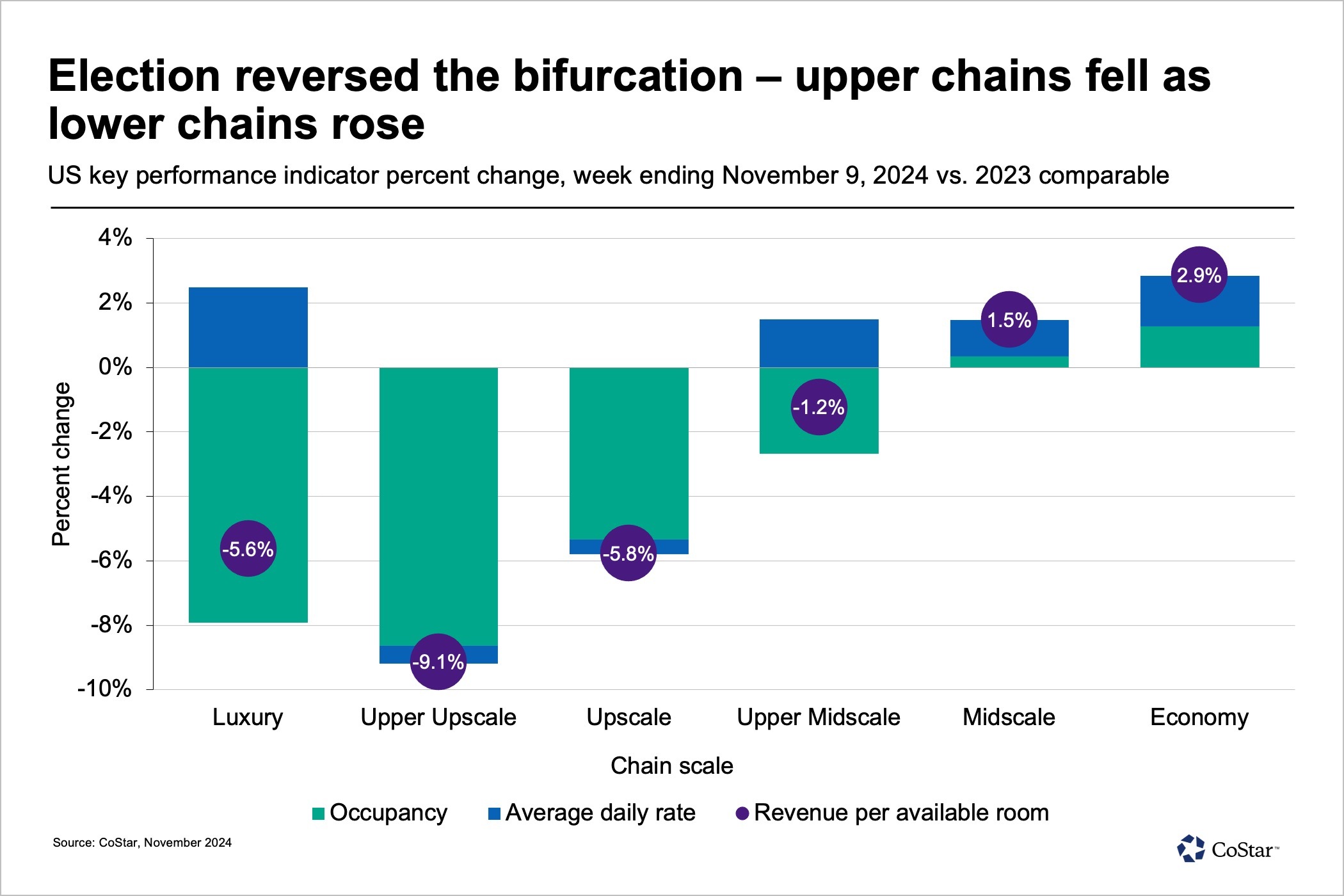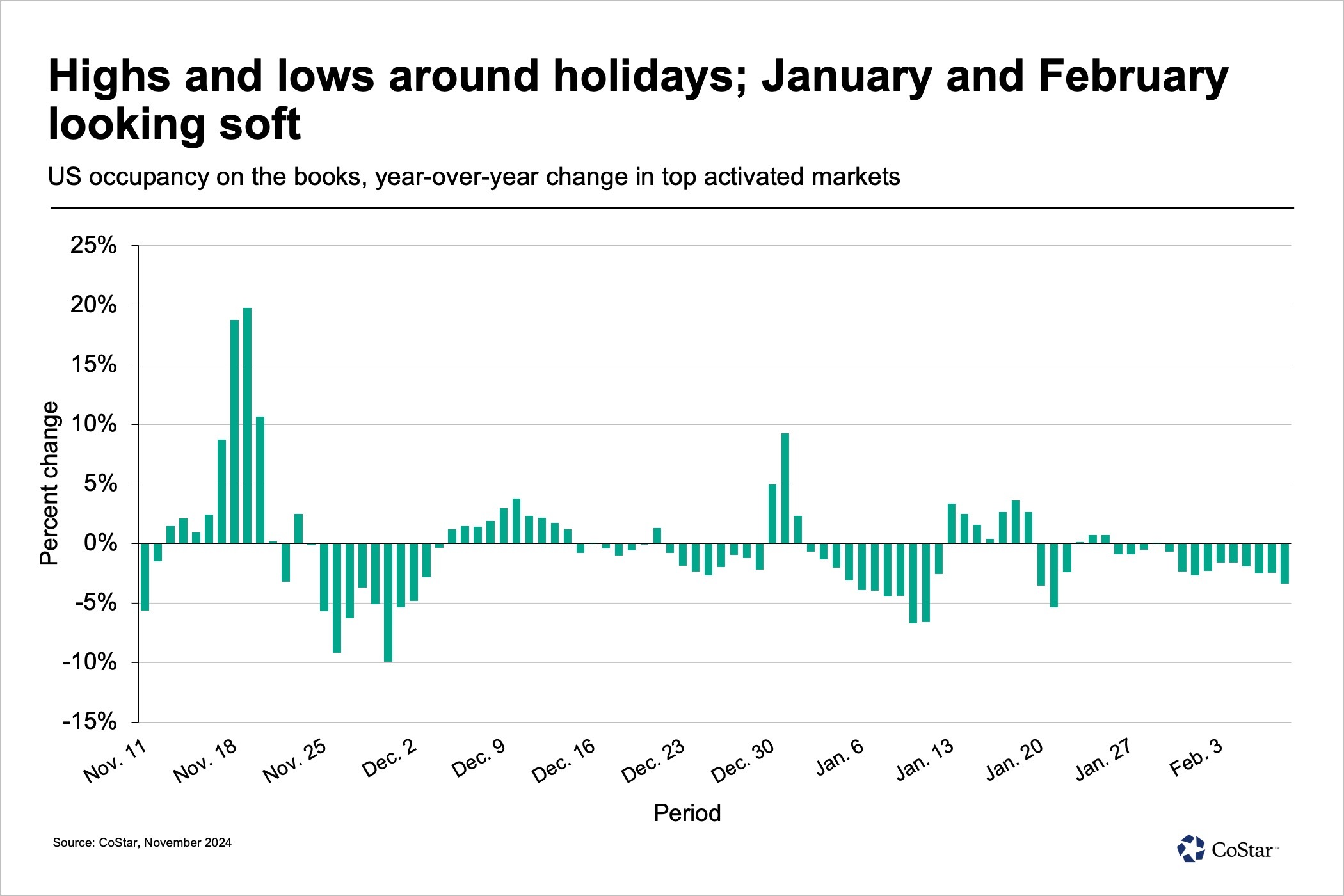As predicted, Election Day in the U.S. disrupted a consistent wave of steady hotel performance in the past several weeks.
The general election paused the healthy gains in revenue per available room seen over the previous four weeks. U.S. hotel RevPAR dropped 3.5% year over year, entirely due to occupancy down 2.3 percentage points with average daily rate basically flat (-0.1%). Monday and Tuesday showed the largest declines with RevPAR down 13.3% and 13.7%, respectively. Wednesday also produced a RevPAR decline, while the rest of the week improved with Thursday up 4.6% and the weekend up 0.6%.

The top 25 U.S. hotel markets experienced the greatest impact with RevPAR down 4.7% overall. Monday and Tuesday combined decreased 15.6%. Las Vegas, Chicago, and Tampa were the only top 25 markets posting RevPAR increases on Monday and Tuesday. Regionally, significant hotel RevPAR declines occurred across the top 25 markets in the Northeast and South while the West – benefitting from strong performance in Las Vegas – and the Midwest – lifted by Chicago – saw growth.
Across the chain scales, the much-discussed bifurcation trend of the past two years reversed. Hotels at the top end of the chain scale saw RevPAR declines while hotels in the lower chain scales saw increases. Upper-upscale hotels experienced the largest RevPAR drop – down 9.1% – while economy hotel chains saw the greatest increase, up 2.9%. Monday and Tuesday produced the worst declines across all chain scales, except economy hotels, ranging from don 23.8% in upper upscale to down 1.5% in midscale. Economy RevPAR during those days increased 2.5%, fueled by a 1.9% gain in ADR.
As reported for the past several weeks, hotel markets affected by Hurricane Helene and Hurricane Milton continued to see growth. In the most recent week, those seven markets – Augusta, Georgia; Columbia, South Carolina; Florida Central South; Greenville/Spartanburg, South Carolina; North Carolina West; Sarasota, Florida; and Tampa – saw RevPAR rise 18.1% on an 11.6-percentage-point increase in occupancy with ADR increasing 16.6%. Sunday through Thursday RevPAR was up 21.9%. Excluding those markets, U.S. RevPAR was down 4.2%. These seven markets were also responsible for the RevPAR growth among midscale and economy hotels, but even without these markets, midscale and economy hotels were flat versus the sharp decreases in the higher-tiered segments.
Football once again left its mark on the weekend across many parts of the country with the following submarkets scoring triple-digit RevPAR gains: South Bend, Indiana (Notre Dame); Lubbock, Texas (Texas Tech), Auburn, Alabama (Auburn University); Tupelo, Mississippi (Ole Miss); Blacksburg, Virginia (Virginia Tech) and Knoxville (Tennessee).
Group demand reflects seasonal slowdown
Group demand among luxury and upper-upscale hotels slowed, dropping 16.8%, which was expected due to the election with Sunday through Wednesday showing double-digit demand declines. Thursday and Friday posted gains while Saturday declined. Absolute group demand of 1.8 million rooms matched the prior week’s level, which was affected by Halloween. Transient demand was down 2.2%. Transient ADR was almost flat (-0.2%), whereas group ADR was up 3.7%.

The holiday season approaches
U.S. hotel RevPAR is expected to rebound in the week ending Nov. 16 with an even more dramatic bounce in the following one due to Thanksgiving being a week later this year. In 2019, when Thanksgiving was on the same day as this year, weekly RevPAR rose 29.6%, which is why it is expected it to be equally strong this year. Thanksgiving week – the week ending Nov. 30 – itself will be slow. The December holiday season will be compressed because of the late Thanksgiving, which should generally produce positive hotel performance.

Global growth sprint continues
Outside the U.S., global hotel RevPAR advanced 10.6%. That was the third consecutive week of double-digit growth, driven primarily by ADR growth of 8.1%, while occupancy increased less than two percentage points to 69%. Every day of the week showed gains with the weekend seeing the strongest performance as RevPAR increased 12.7%, also driven by ADR (+7.2%) with occupancy at 72.4%, up 3.5 percentage points. Weekend occupancy has been above 70% in 25 of the past 26 weeks.
Japan led the top countries in RevPAR growth – up 36.4% – with ADR as the exclusive driver as occupancy declined slightly by 0.9%. All but one of the 11 Japanese markets posted weekly gains. Italy, Spain, Indonesia and Mexico also reported double-digit growth with most markets across each country reporting gains.

Room demand in China rose for a fourth consecutive week, while ADR declined 4.4%, resulting in a 3.3% retreat in RevPAR. Increasing room demand and declining ADR occurred across most markets in China, however, this was not the case across the 10 largest countries based on rooms supply. Nine of the 10 markets reported demand gains and of these nine, only two reported ADR declines.
Canada will receive a boost for the final shows of Taylor Swift’s Eras tour in Toronto and Vancouver, ending her welcomed contribution to the hotel industry and global economy. Top global countries are expected to continue seeing strong yet slowing RevPAR growth.
Isaac Collazo is vice president of analytics at STR. Chris Klauda is senior director of market insights at STR.
This article represents an interpretation of data collected by CoStar's hospitality analytics firm, STR. Please feel free to contact an editor with any questions or concerns. For more analysis of STR data, visit the data insights blog on STR.com.
